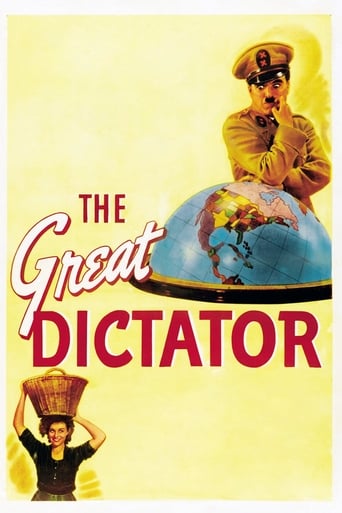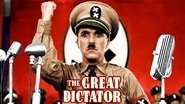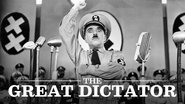DonAlberto
Do it all yourself and do it all right. This is what Charlie Chaplin does in this brilliant film. He's the producer, star, scriptwriter and director of The Great Dictator, his firs talkie (sound movie). And one can't help but wondering if the art of this British genius was somewhat affected by the arrival of sound, by the changes that it brought about both for actors and audiences. Judging by how good the film is, I'd say that it didn't.A.Hynkel is the dictator and absolute ruler of Tomaine. This role and the one of a Jewish barber are both played by Chaplin. Although the picture is aimed at criticizing Germany and fascism, the first scenes are used to show us Chalie Chaplin's character fighting in the Great War. Comic scenes are intertwined with satire-driven ones, which only increases the difficulty to know where this masterpiece stands. Its legendary status and reputation are undeniable but.....Is it a comedy? Is it a drama? Does it stand alone on a genre of its own? I guess that's up to the viewers. I can only say I see no easy way out of that dilemma, as we have a little bit of everything in the film. realistic depiction of Jews and their struggles, critique of Hitler, Mussolini and fascism through humour. There's one poignant speech at the end of the film that serves in a double purpose: to close the movie in a spectacular fashion and to give us something to cheer us up, something to remember and hold on to in moments of despair.
areatw
The tagline of 'The Great Dictator' is 'the comedy masterpiece', and I couldn't think of a better line to sum this film up. It's a hilarious political satire, but it also delivers an important message. This film was released at a time when Hitler was at the height of his power and dictator Hynkel is obviously a reference to him.Charlie Chaplin is simply outstanding in this in what was his first spoken film. He shines in both of his roles as dictator Hynkel and the Jewish barber. Chaplin's speech at the end, which is very much HIS speech even though he's playing a character, is a piece of cinema I will never forget. Such a powerful, moving and compelling speech that remains relevant even today.Making a comedy out of such a tragedy is risky business, but Chaplin's anti-fascist message ensured it wasn't taken the wrong way. 'The Great Dictator' is a hilarious but meaningful and powerful film. A brilliant piece of cinema.
ben hibburd
The Great Dictator Is written and directed by Charlie Chaplin. It also sees him play duel roles. In the primary role he plays Dictator Adenoid Hynkel of a fictional country called Tomainia. Who over the course of the film tries to expand his empire by trying to borrow money from a Jewish banker In order to Invade his neighbouring country of Osterlich. After being refused the loan he orders the purge of Jewish community which was already being subjugated under his orders.Chaplins second role Is juxtaposed against Hynkel, he plays a Jewish barber(his name is never given) and Is a WW1 veteran. Who In the process of saving the life of a wounded pilot, loses his own memory. Twenty years later returns to the ghetto where he falls In love with Hannah(Paulette Goddard), and tries to go back to being a barber. However after being constantly harassed by Hynkels stormtroopers, finds himself on the run.The set up and story of this film is fairly basic, and offers no surprises, but the film never Intends to. Instead this Is a platform for Chaplin to voice a larger message. The film was made In 1940, at the time the USA hadn't entered the war yet. Whilst the horrors and persecution of the Jewish people hadn't been fully realised yet at that point In time. If It had of been know, I think this would've been a very different film, It probably wouldn't of even been made.This if one of only a couple of films In which Chaplin spoke In, and It's this reason why the film feels more powerful then It would've been had someone else starred In It. This is personified In what many people would agree to be the finest speech In film history at the end of the film. The last five minutes of the film are by far and away the most famous aspect of the film, and for good reason. It's a rousing and profound speech, that comes straight from Chaplins heart. It's a speech that speaks too the very goodness of humanity. It's also made all the more effective coming from a man known for his silence.Whilst the last few minutes of the film has a very serious tone and message. The film contains the usual levity and slapstick humour that Is associated with Chaplins work. There are many moments of excellent satire peppered all throughout the film. my personal favourite being when the Barber meets up with the pilot he saved twenty years later(Schultz). Schultz saves him from being taken by the Stormtroopers. He says to the barber "Strange, and I always thought of you as an Aryan" To which Chaplins barber responds "I'm a vegetarian" In a deadpan manner. There are a few jokes that do feel a little dated. The majority however hit their mark, and feel fresh and contemporary In todays current climate.The Great Dictator came out at an Important time not just film history, but human history. Whilst some of the satire Is a little too on the nose. The film did what it needed too do with flying colours, It's a beautiful film to watch and the editing and direction is on point. The Great Dictator maybe arguably one of the most important films ever made. It's a film that everyone should watch at-least once In their life-time.
david-sarkies
This is probably the film that Chaplin is best known for, even though it isn't actually one of the films from the repertoire of silent classics. In a way it is not so much a criticism of Fascism in Europe but rather a criticism of US isolationism. However, it doesn't necessarily seem to be that as Chaplin seems to be making a mockery of the fascist dictators in Europe as opposed to actually confronting his viewers with the reality of the situation, and while in a sense we may, at least at this time, consider Hitler to be something of a joke, the reality of the horrors weren't going to come to the fore until much later.The film beings in World War I, where a Jewish barber is fighting on the Front Lines, and then ends up not only saving a pilot, but after crashing the plane ending up in hospital with amnesia. Twenty years later we have him leave the hospital and return to the ghetto to see that in one sense nothing has changed, but in another sense quite a lot has changed. The thing is that the Jews up to that time have always lived in Ghettos, and have always suffered persecution under the hands to those around them, however things seemed to be getting a lot worse.The Great Dictator cuts between Hynkle, who is played by Chaplin, and the Barber, who is also played by Chaplin. The Hynkle scenes are in a sense a lot of slapstick, in a way that politicians are mocked. It is similar with the barber scenes, yet Chaplin seems to be trying to challenge us with the problems that the Jews were living under at the time, and the nature of extreme racism. However, he also seemed to be trying to open our eyes to the fact that this wasn't just the case in Germany, but everywhere. The thing was that nobody particularly cared about the Jews, which is why Hitler was able to get away with what he did, though we must remember that he did work to cover the holocaust up somewhat.It isn't a silent film though, which sort confronted me at least since Chaplin was one of the masters of the silent era. However, I doubt it would have worked as one. What is interesting though are the speeches. Obviously there is the great speech that is delivered at the end, which is in effect let's stop being mean to each other and start to learn to actually get along. We also have Hynkle's speeches which are basically gibberish. At first I thought he may have been just mocking Hitler, but there is also that essence with the idea that it is not the content that actually matters, but the energy with which it is delivered. In a way Hitler, like many other populist politicians, are able to get people on side simply by telling them what they want to hear. Also, one could even suggest that the content could be drastically changed, but as long as the energy that delivered the original speech is replicated, then people will simply continue to follow along blindly, which is why the barber was able to get away with what he did.









